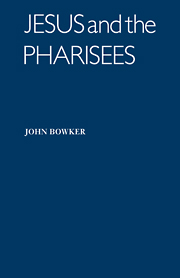Book contents
- Frontmatter
- Contents
- Dedication
- Preface
- Acknowledgements
- Abbreviations
- Note on transliterations
- Introduction
- Additional note: controversies against Sadducees and/or Boethusians
- 1 Josephus
- 2 Mishnah
- 3 Tosefta
- 4 Babylonian Talmud
- 5 Palestinian Talmud
- 6 Other rabbinic works
- 7 Megillath Ta'anith
- 8 Dead Sea Scrolls
- 9 Apocryphal works
- Bibliography
- Indexes
- Frontmatter
- Contents
- Dedication
- Preface
- Acknowledgements
- Abbreviations
- Note on transliterations
- Introduction
- Additional note: controversies against Sadducees and/or Boethusians
- 1 Josephus
- 2 Mishnah
- 3 Tosefta
- 4 Babylonian Talmud
- 5 Palestinian Talmud
- 6 Other rabbinic works
- 7 Megillath Ta'anith
- 8 Dead Sea Scrolls
- 9 Apocryphal works
- Bibliography
- Indexes
Summary
Ber. 1.4
The Ḥaberim say in the name of R. Johanan: ‘The words of the scribes (dibre sopherim) are related to the words of Torah and are to be loved like the words of Torah …’ R. Ishmael said: ‘The words of Torah include both prohibitions and permissions; they include commands both of light and weighty importance, but the words of the scribes (dibre sopherim) are all weighty. This can be known from the saying, “He who says that there should be no tephillin, thereby contradicting Torah, is without guilt, but (he who says) there should be five compartments, thereby adding to the words of the scribes (dibre sopherim) is guilty.”’ R. Ḥananiah b. R. Ada said in the name of R. Tanhum b. R. Hiyya: ‘The words of the elders (dibre zeqenim) are weightier than the words of the prophets, as it is written: “Prophesy not, who prophesy: they shall not prophesy to them, these insults are their own invention” [Mic. ii.6]; then it is written: “I will prophesy to you of wine and strong drink” [Mic. ii.n].’
The latter part also appears in J.San. x.3 where M.San. xi.3 has dibre sopherim for dibre zeqenim. A further passage from J.Ber. i.4 appears in J.Yeb. i.6 (5.13). On the ‘words of the scribes’, see 2.24 and the further references.
- Type
- Chapter
- Information
- Jesus and the Pharisees , pp. 154 - 161Publisher: Cambridge University PressPrint publication year: 1973



